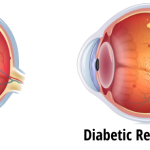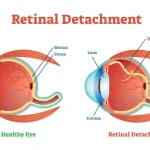
10 Surprising Causes of Eye Problems You Never Knew About
Introduction:
While we often associate eye problems with age-related conditions or genetic factors, there are several surprising causes that can affect our eye health. In this article, we will explore ten lesser-known causes of eye problems that you may not be aware of.
1. Digital Eye Strain: The Price of Technology
In our modern digital age, many of us spend long hours staring at screens, be it computers, smartphones, or tablets. This excessive screen time can lead to digital eye strain, characterized by symptoms such as dryness, blurred vision, and headaches. To prevent digital eye strain, it is crucial to take regular breaks, practice the 20-20-20 rule, and consider using blue light filters or glasses.
2. Smoking and Eye Health: A Risky Combination
Smoking is not only detrimental to our overall health but also has a profound impact on our eyes. It increases the risk of developing eye conditions such as cataracts, age-related macular degeneration (AMD), and dry eye syndrome. The harmful chemicals in tobacco smoke can damage the blood vessels in the eyes, leading to vision loss. Quitting smoking is a vital step toward preserving your eye health and reducing the risk of these conditions.
3. Indoor Air Pollution: Unseen Culprit for Eye Problems
We often associate air pollution with outdoor environments, but indoor air quality can also affect our eye health. Indoor pollutants such as dust, pet dander, and chemicals from cleaning products can cause eye irritation, redness, and allergies. Maintaining good indoor air quality, regularly cleaning your living spaces, and using air purifiers can significantly reduce the risk of eye problems associated with indoor air pollution.
4. Poor Nutrition: A Blind Spot for Eye Health
Deficiencies in essential nutrients like vitamin A, C, E, and omega-3 fatty acids can lead to vision problems. Incorporating a variety of fruits, vegetables, fish, nuts, and seeds into your diet can provide the necessary nutrients to support healthy eyes and reduce the risk of eye conditions such as dry eyes and age-related macular degeneration.
5. Hormonal Changes and Vision: Not Just a Women’s Issue
Hormonal fluctuations can impact the health of our eyes, and this is not limited to women alone. Conditions such as dry eyes, blurry vision, and light sensitivity can be influenced by hormonal changes during puberty, pregnancy, and menopause. Regular eye examinations, managing underlying health conditions, and using artificial tears or lubricating eye drops can help alleviate these symptoms and maintain optimal eye health.
6. Medications and Eye Side Effects: Unwanted Consequences
Certain medications that we take for other health conditions can have adverse effects on our eyes. Some drugs, like corticosteroids and antihistamines, can cause dry eyes and other vision-related issues. It is essential to be aware of the potential side effects of any medications you are taking and discuss any concerns with your healthcare provider. They may offer alternatives or suggest additional measures to protect your eyes.
7. Lack of Sleep: Tired Eyes, Blurry Vision
Sleep deprivation not only affects our energy levels and overall well-being but also takes a toll on our eye health. Insufficient sleep can lead to dry eyes, eye fatigue, and blurred vision. Getting an adequate amount of quality sleep each night is crucial for allowing your eyes to rest and regenerate. Establishing a regular sleep routine, creating a comfortable sleep environment, and practicing good sleep hygiene can help prevent eye problems associated with lack of sleep.
8. Allergies and Eye Health: A Sneezing Sight
Seasonal allergies, also known as hay fever, can wreak havoc on our eyes. The allergens in the air, such as pollen or dust mites, can cause redness, itching, and watering of the eyes. Taking antihistamines, using saline eye drops, and avoiding allergens whenever possible can provide relief and minimize the impact of allergies on your eye health.
9. Prolonged Sun Exposure: More Than Meets the Eye
We all know the importance of protecting our skin from the sun’s harmful rays, but we often overlook the impact of sun exposure on our eyes. Prolonged exposure to ultraviolet (UV) radiation can lead to cataracts, macular degeneration, and corneal sunburn. Wearing sunglasses with UV protection, a wide-brimmed hat, and avoiding direct sunlight during peak hours can safeguard your eyes from the damaging effects of the sun.
10. Stress and Eye Strain: An Unseen Burden
Chronic stress not only affects our mental and physical well-being but can also impact our eyes. Stress can cause eye strain, tension headaches, and even exacerbate existing eye conditions. Incorporating stress-reducing techniques such as meditation, exercise, and maintaining a healthy work-life balance can help alleviate the strain on your eyes and promote overall eye health.





